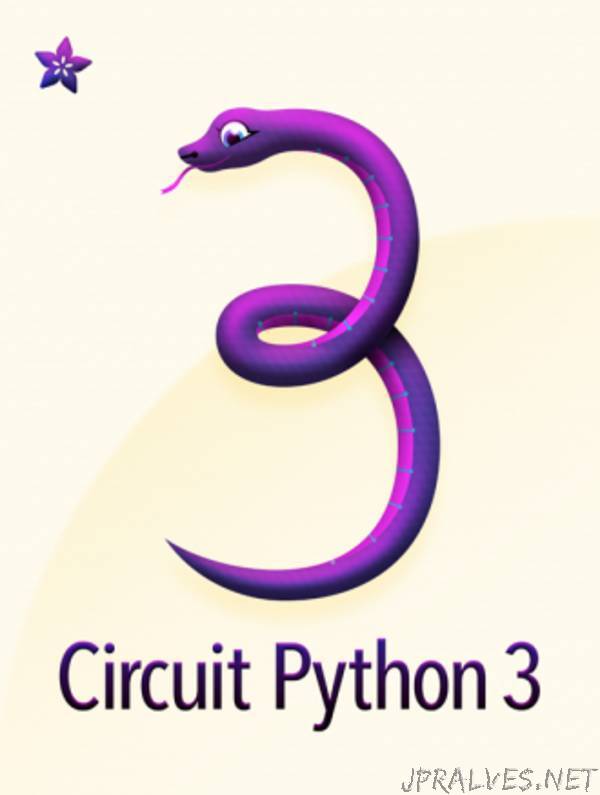
“3.0.0 is the latest major revision of CircuitPython and features new support for the SAMD51 (aka M4) and preliminary support for the nRF52 BLE chipset. It also features better memory utilization so more can be loaded in the same amount of space.
General release
We believe this release is stable and relatively bug free. So, please try this before trying 2.x. If you find issues please file an issue.
Changes since Release Candidate 1
Update frozen crickit library. Thanks @dhalbert.
Fix pull setting for DigitalInOut. Thanks @cater, @kattni, @dhalbert.
Installation
To install follow the instructions in our new Welcome to CircuitPython! guide. To install the latest libraries, see this page in that guide.
Try the latest version of the Mu editor for creating and editing your CircuitPython programs and for easy access to the CircuitPython serial connection (the REPL).
All builds are available as both UF2 and bin files here along with test builds.
New Features in 3.0.0
Support for SAMD51 based M4 boards from Adafruit. Thanks @tannewt, @dhalbert, @siddaciousand all the M4 testers.
Preliminary support for nRF52 BLE capable boards. Thanks @glennrub, @tralamazza, @microbuilder, @arturo182, @hathach and @jerryneedell.
Long-lived heap allocations are better compacted. (Video) Thanks @tannewt and @dhalbert.
Read the microcontroller’s unique id through microcontroller.cpu.uid. Thanks @sommersoft!
UART can now be created with only one direction. Thanks @dhalbert!
Files to prevent mac from indexing the drive are created automatically. Thanks @jepler!
and = implemented for array.array. Thanks @jepler!
Implemented seeking to non-zero locations. Thanks @aykevl and @jepler.
Detect when USB has been plugged in with supervisor.runtime.serial_connected. Thanks @sommersoft and @dhalbert.
Change file system label (CIRCUITPY by default) using storage.getmount(“/”).label.
Add storage.erase_filesystem() to make erasing the file system easy. Thanks @dhalbert!
atmel-samd: usb_hid support include Consumer Controls (aka multimedia keys) and Gamepad. Thanks @dhalbert.
Support atmel-samd real-time clock (RTC) as main time source. Thanks @notro!
Add audiobusio.I2SOut support and split samples into audioio.RawSample and audioio.WaveFile. Thanks @tannewt
AudioOut and I2SOut now support pause and resume while playing back a sample. Thanks @tannewt
samd.clock added to enable low level clock tuning. Thanks @notro
supervisor.reload() now available to reload the VM. It no longer uses KeyboardInterruptException but rather its own ReloadException. Thanks to @rhooper
Add board.I2C(), board.SPI() and board.UART() as singleton objects for default buses as defined on the board. Thanks to @matt-land
Longints are now supported on M0 Express boards (along with M4 boards). Thanks to @notro and @dhalbert
Add custom board for CircuitPlayground Crickit. Thanks to @dhalbert and @ladyada
Support for the Pirkey M0. Thanks @dhalbert
Add rotaryio to support rotary encoders. Thanks to @tannewt and @dhalbert
Auto-pause PulseIn during high frequency input thanks to @tannewt, @dhalbert and @jerryneedell
ESP8266 is now auto-built by Travis thanks to @jepler
Code has been reorganized to ease sharing main code across ports.
Breaking Changes!
ustruct has been replaced with struct to match CPython.
ucollections has been replaced with collections to match CPython. Thanks @bildzeitung.
ubinascii is renamed binascii to match CPython. Thanks @jepler
The mpy format has changed so make sure and use a 3.0.0 bundle for libraries.
Non-standard array types inherited from MicroPython are no longer supported in favor of matching CPython. Thanks to @jepler.
audioio.AudioOut now takes the sample to playback in play rather than in the constructor. (This enables playback through other outputs such as audiobusio.I2SOut.) It also means you only need one AudioOut for multiple samples.
PDMIn‘s frequency property has been renamed to sample_rate.
Trinket M0 and Gemma M0 builds no longer include pin objects for all microcontroller pins. They only include those used by the board. Thanks to @rhooper
Auto-reload no longer uses KeyboardInterruptException but rather its own ReloadException.”
